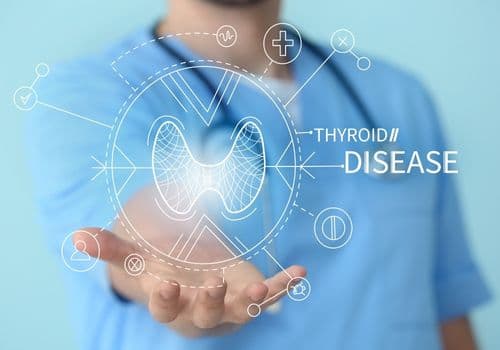
Obesity is a major health concern that affects millions of people worldwide. Not only does it increase the risk of heart disease, diabetes, and certain cancers, but it can also lead to a number of other health problems, including thyroid dysfunction.
The Thyroid
The thyroid gland is a small butterfly-shaped organ located in the neck that produces hormones that regulate metabolism. When the thyroid gland is not functioning properly, it can lead to a number of problems, including hypothyroidism (an underactive thyroid) and hyperthyroidism (an overactive thyroid). Both of these conditions can have serious consequences if left untreated.
Obesity’s Effect on the Thyroid
One of the main ways in which obesity can cause thyroid problems is by putting pressure on the thyroid gland. The thyroid gland is located in the neck, just above the collarbone. When a person is overweight or obese, the extra fat in the neck can put pressure on the thyroid gland and make it difficult for it to function properly. This can lead to the development of hypothyroidism, which is characterized by a number of symptoms such as fatigue, weight gain, and cold intolerance
The Effects of Chronic Inflammation
Obesity is a known risk factor for chronic inflammation, and this can also affect the thyroid gland. When that inflammation becomes chronic, it can lead to a number of health problems. When the thyroid gland becomes inflamed, it can lead to the development of autoimmune thyroid disorders, such as Hashimoto’s thyroiditis. This is an autoimmune disorder in which the body’s immune system mistakenly attacks the thyroid gland, leading to inflammation and eventual destruction of the gland. This can result in hypothyroidism, which is a condition characterized by an underactive thyroid gland.
Obesity can also increase the risk of developing other autoimmune disorders, such as type 2 diabetes and rheumatoid arthritis, which can also affect the thyroid gland. This can further exacerbate the inflammation and increase the risk of developing autoimmune thyroid disorders.

Does Obesity Cause Thyroid Problems?
Obesity can also affect the sensitivity of cells to thyroid hormones. Obesity can have a significant impact on the way the body utilizes thyroid hormones. The thyroid hormones, triiodothyronine (T3) and thyroxine (T4), are essential for regulating metabolism and energy levels in the body. They bind to specific receptors on cells throughout the body, including the brain, liver, and muscles, triggering the cells to carry out their various functions.
When a person is overweight or obese, the cells in the body can become less sensitive to thyroid hormones. This is known as “thyroid hormone resistance”. This means that even if the thyroid gland is producing enough hormones, the cells in the body may not be able to use them effectively. This can lead to a number of problems, including weight gain, fatigue, and cold intolerance.
The exact mechanism behind thyroid hormone resistance in obesity is not fully understood, but it is thought to be related to increased levels of inflammation and oxidative stress in the body. Inflammation and oxidative stress can disrupt the signaling pathways that allow the thyroid hormones to bind to their receptors on the cells, making the cells less sensitive to the hormones.
Additionally, there’s also the presence of high levels of leptin and insulin in the body, both of which are hormones that regulate appetite and metabolism. When these hormones are present in high levels, they can disrupt the signaling pathways that allow the thyroid hormones to bind to their receptors, leading to decreased sensitivity of cells to thyroid hormones.
Thyroid hormone resistance
In cases of thyroid hormone resistance, even when the thyroid gland is producing enough
hormones, the cells in the body may not be able to use them effectively, leading to symptoms such as weight gain, fatigue, and cold intolerance. This is why some individuals may have normal thyroid hormone levels but still have symptoms of hypothyroidism. It’s important to note that weight loss can improve the sensitivity of the cells to thyroid hormones, but in some cases, medication may also be necessary to help regulate the thyroid gland.
Obesity can cause thyroid problems in a variety of ways. It can put pressure on the thyroid
gland, lead to inflammation, affect the production and release of thyroid hormones, and affect the sensitivity of cells to thyroid hormones. If you are overweight or obese and are experiencing symptoms of thyroid dysfunction, such as fatigue, weight gain, and cold intolerance, it is important to see your doctor for an evaluation.
Your doctor will be able to determine the cause of your symptoms and recommend the appropriate treatment. This may include lifestyle changes such as weight loss, as well as medications to help regulate the thyroid gland. With the right treatment, it is possible to manage and even reverse the effects of obesity on the thyroid gland. Reach out to your healthcare professional to make positive lifestyle choices today and consider the aid of the Spatz3 adjustable gastric balloon. This might help you to lose weight and lessen your chances of thyroid problems or other health concerns.


